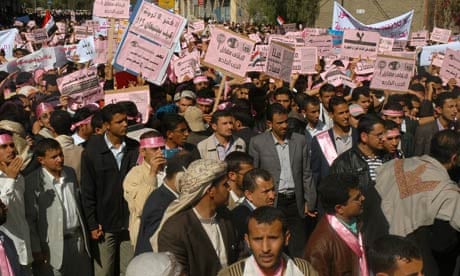Thousands of people took to the streets of Sana'a today, calling for an end to the reign of President Ali Abdullah Saleh in some of the biggest anti-government rallies Yemen has seen for a decade.
Spurred on by events in Tunisia and Egypt, students and opposition activists assembled across the capital chanting for Saleh to quit after 32 years in power.
"It's over Saleh, your time is up!" shouted a crowd of students, rattling the gates of Sana'a University.
The protests were organised by Yemen's opposition coalition, which includes the Islamist party Islah, as well as the Socialist and Nasserite party. However, unlike protests last weekend in Sana'a when riot police used teargas and batons to disperse protesters, a relative calm and an almost carnival-like atmosphere prevailed.
Protesters are demanding improvements in living conditions as well as political reform. One banner read simply: "Look at the gap between the rich and poor."
Yemen, the poorest country in the Arab world, is struggling with rising unemployment and dwindling oil and water reserves. Almost half its 23 million people live on $2 or less a day, while one-third suffer from chronic hunger.
In one protest, a group of 3,000 men gathered outside the house of Abdullah al-Ahmar, the former leader of the Islamist party Islah. "We are here to say enough, enough, the president should go," Mohammed al-Sabri, a leading opposition figure, told the crowds.
Around 15,000 students and activists wearing pink ties on their heads formed a "human wall" at Sana'a University, which has become a hub for the protests.
"We choose pink to represent the Jasmine revolution and to show that we do not want violence," said Rudhwan Masude, head of the student union at Sana'a University. "We didn't give [the security] a chance to find fault in our demonstration or attack us like they did last time."
The rallies follow several days of smaller protests calling for Saleh to quit. Tensions boiled over on Sunday when plainclothes officers arrested Tawakul Karman, an activist who had helped organise the protest. She was freed on Monday with a pledge from her family that she would "no longer offend public order and law".
Nasser Araybee, a Yemeni journalist with al-Ahram weekly, said: "These were not spontaneous or popular protests like in Egypt, but rather mass-rallies organised by the opposition who are using events in Tunisia to test Saleh's regime. This is only the start of a fierce political battle in the run-up to Yemen's parliamentary elections in April."
Earlier this month, Yemen's parliament gave preliminary approval to a constitutional amendment ending limits to the president's term of office, a measure that would allow Saleh to stay in power past his mandate, which ends in 2013.
Saleh's ruling General People's Congress staged counter marches across the capital today, attended by hundreds of government supporters.
In a bid to defuse tensions Saleh has raised army and civil servant salaries, and denied claims he plans to install his son, Ahmed, as his successor. Saleh has also ordered income taxes to be halved, and has told ministers to control prices.
Additional reporting by Shatha al-Harazi
